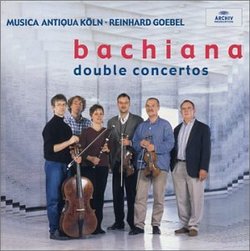Good Stuff from the Bach Boys
11/10/2003
(5 out of 5 stars)
"Let's face it. There have been many of these "Sons of Bach" albums, and while they introduce us to the wealth of talent in the Bach family, they often end up just underscoring by how much Johann Sebastian's talent outstripped that of the rest of the clan. I can't say you'll come away from this disc with a new appreciation of Bach's prolific progeny, but I will be surprised if you don't find this is one of the most enjoyable and successful such collections to come along. First, the music. As the notes to this recording point out, Wilhelm Friedemann's concerto is a pretty exciting recent scholarly discovery. I doubt, as the notes suggest, that it has any claim to rival in popularity J. S.'s Suite in B Minor, but I will say this: it is just about the equal of C. P. E. Bach's well-known and admired concertos, with a slow movement that has the tender melodiousness of the best of J. C. Bach, while the outer movements have some of the clever harmonic-melodic twists and turns that C. P. E. is famous for.Unfortunately, the lone representative here from J. C. is attractive and diverting but not one of his best works. It sounds, as all the lesser pieces by this composer sound, like Mozart without genius. There is better J. C. Bach music around.But then the work by J. Ch. F. Bach, the least remembered of the Bach sons, is well above what I have heard from him in the past. The Concerto for Fortepiano and Viola is a novel concept, and it is approached with imagination by J. Ch. F. The quality of invention is well sustained in this big work--at almost 26 minutes by far the most substantial composition on the disc. I liked especially the opening movement marked allegro con brio, a successful blend of fire and lyricism. While it is the most striking movement, the others have their moments of beauty and drama too; overall, this is a concerto of great interest.Last and best is the valedictory concerto of C. P. E. Bach, certainly the greatest of J. S.'s sons. The Concerto for Harpsichord and Fortepiano is an off-beat masterwork in which C. P. E. bids farewell to the harpsichord by playing it off against its young cousin the fortepiano, now in the ascendancy. The concerto is a wonderful exploration of the sonorities of both instruments, and if they were rivals in the music world, here they are instead civilized conversationalists. If you enjoy C. P. E. Bach's strange harmonic explorations and melodies that turn on a dime, here they are in extremely enjoyable abundance. The last movement is a joyous, youthful romp, remarkable coming from the 70-something C. P. E.If the music is fine, the music making is extraordinary. Musica Antiqua and Goebel always have novel things to say about the novelties they profer, and these performances are no exception. The playing is wonderfully fluid, dramatic when it needs to be (I always love the horns), plangent and tender when that is called for. Excellent sound rounds out the package: it's close but atmospheric, with great detail as well as timbral realism. I highly recommend this one."
Interesthing evolution to the romantic period
François Beaudoin | Québec, Canada (where we speak french...) | 03/13/2003
(5 out of 5 stars)
"After an anthology of the ascendants of J.S.B., Goebel is concernerd about his four sons. The most convincing moment of this Cd is the "Symphonie concertante pour violon et violoncelle", which is elegant and refined. A big surprise: "Le Concerto pour flûte" of Wilhelm Frieedemann is astonishing. It is full of strenght ! The flautist,Verena Fischer,is radiant. The curious concerto of Johann Christoph Friedrich, for " hammerflügel, alto and orchestra" is strange and beautiful. You must hear Robert Hill (formidable at the hammerflügel) hold a dialogue with Reinhard Goebel (alto). This is delightful! The "Concerto pour pianoforte, clavecin et orchestre" of Carl Philipp Emmanuel is the most known piece of this CD. Goebel and his brilliant soloist are palying with a frenzy spirit ! Very stimulating CD ! The sound is deep and delicious ! Archiv does it again. Goebel too."

